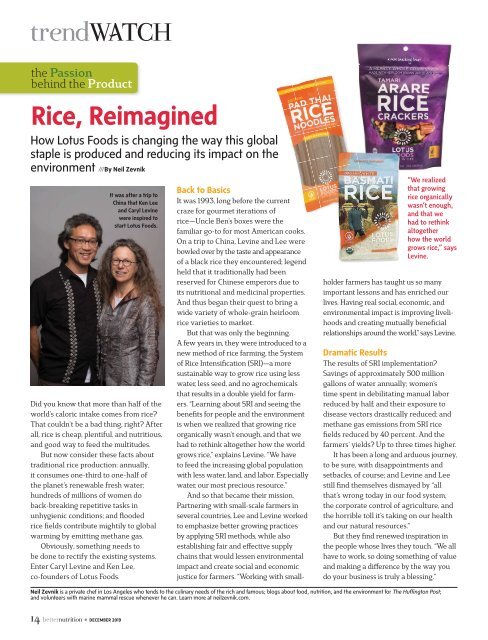You also want an ePaper? Increase the reach of your titles
YUMPU automatically turns print PDFs into web optimized ePapers that Google loves.
trendWATCH<br />
Back to Basics<br />
It was 1993, long before the current<br />
craze for gourmet iterations of<br />
rice—Uncle Ben’s boxes were the<br />
familiar go-to for most American cooks.<br />
On a trip to China, Levine and Lee were<br />
bowled over by the taste and appearance<br />
of a black rice they encountered; legend<br />
held that it traditionally had been<br />
reserved for Chinese emperors due to<br />
its nutritional and medicinal properties.<br />
And thus began their quest to bring a<br />
wide variety of whole-grain heirloom<br />
rice varieties to market.<br />
But that was only the beginning.<br />
A few years in, they were introduced to a<br />
new method of rice farming, the System<br />
of Rice Intensification (SRI)—a more<br />
sustainable way to grow rice using less<br />
water, less seed, and no agrochemicals<br />
that results in a double yield for farmers.<br />
“Learning about SRI and seeing the<br />
benefits for people and the environment<br />
is when we realized that growing rice<br />
organically wasn’t enough, and that we<br />
had to rethink altogether how the world<br />
grows rice,” explains Levine. “We have<br />
to feed the increasing global population<br />
with less water, land, and labor. Especially<br />
water, our most precious resource.”<br />
And so that became their mission.<br />
Partnering with small-scale farmers in<br />
several countries, Lee and Levine worked<br />
to emphasize better growing practices<br />
by applying SRI methods, while also<br />
establishing fair and effective supply<br />
chains that would lessen environmental<br />
impact and create social and economic<br />
justice for farmers. “Working with smallthe<br />
Passion<br />
behind the Product<br />
Rice, Reimagined<br />
How Lotus Foods is changing the way this global<br />
staple is produced and reducing its impact on the<br />
environment /// By Neil Zevnik<br />
It was after a trip to<br />
China that Ken Lee<br />
and Caryl Levine<br />
were inspired to<br />
start Lotus Foods.<br />
Did you know that more than half of the<br />
world’s caloric intake comes from rice?<br />
That couldn’t be a bad thing, right? After<br />
all, rice is cheap, plentiful, and nutritious,<br />
and good way to feed the multitudes.<br />
But now consider these facts about<br />
traditional rice production: annually,<br />
it consumes one-third to one-half of<br />
the planet’s renewable fresh water;<br />
hundreds of millions of women do<br />
back-breaking repetitive tasks in<br />
unhygienic conditions; and flooded<br />
rice fields contribute mightily to global<br />
warming by emitting methane gas.<br />
Obviously, something needs to<br />
be done to rectify the existing systems.<br />
Enter Caryl Levine and Ken Lee,<br />
co-founders of Lotus Foods.<br />
“We realized<br />
that growing<br />
rice organically<br />
wasn’t enough,<br />
and that we<br />
had to rethink<br />
altogether<br />
how the world<br />
grows rice,” says<br />
Levine.<br />
holder farmers has taught us so many<br />
important lessons and has enriched our<br />
lives. Having real social, economic, and<br />
environmental impact is improving livelihoods<br />
and creating mutually beneficial<br />
relationships around the world,” says Levine.<br />
Dramatic Results<br />
The results of SRI implementation?<br />
Savings of approximately 500 million<br />
gallons of water annually; women’s<br />
time spent in debilitating manual labor<br />
reduced by half, and their exposure to<br />
disease vectors drastically reduced; and<br />
methane gas emissions from SRI rice<br />
fields reduced by 40 percent. And the<br />
farmers’ yields? Up to three times higher.<br />
It has been a long and arduous journey,<br />
to be sure, with disappointments and<br />
setbacks, of course; and Levine and Lee<br />
still find themselves dismayed by “all<br />
that’s wrong today in our food system,<br />
the corporate control of agriculture, and<br />
the horrible toll it’s taking on our health<br />
and our natural resources.”<br />
But they find renewed inspiration in<br />
the people whose lives they touch. “We all<br />
have to work, so doing something of value<br />
and making a difference by the way you<br />
do your business is truly a blessing.”<br />
Neil Zevnik is a private chef in Los Angeles who tends to the culinary needs of the rich and famous; blogs about food, nutrition, and the environment for The Huffington Post;<br />
and volunteers with marine mammal rescue whenever he can. Learn more at neilzevnik.com.<br />
14 • DECEMBER <strong>2019</strong>

















